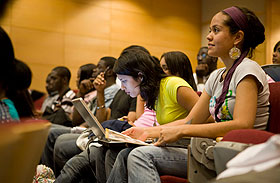  |
| HOME | THIS ISSUE | CALENDAR | GRANTS | BACK ISSUES | < BACK | NEXT > |
Minority students conduct research, prepare for graduate work by Sherry Fisher - August 25, 2008 | ||||
| Undergraduate minority students from colleges and universities across the United States conducted research at UConn this summer and were introduced to the world of graduate studies. Thirty-six students participated in the Northeast Alliance Summer Research Program for Minority Undergraduates from June 2 to Aug. 9. The NSF-sponsored program is designed to encourage and prepare underrepresented students for doctoral studies. The program, now in its third year at UConn, is directed by Ruth Washington and Lee Aggison, a married couple who are associate professors-in-residence in the molecular and cell biology department. Aggison is also associate dean of the Graduate School. The program has grown from six students during the first year, to 36, this summer. Students in the program are juniors and rising seniors who have shown a strong interest in research at their home institutions. They are paired for the summer with a UConn faculty researcher and a graduate student mentor, and conduct research under their supervision. In addition to research, students participate in seminars and workshops on issues related to their academic, personal, and professional growth. Each student makes a poster presentation on their research at the end of the program. Aggison and Washington say the program is an excellent opportunity to expose underrepresented students to graduate studies in the sciences. “Increasing diversity in the sciences and engineering is very important,” Aggison says. “More qualified minority faculty are needed in these areas, and this program puts us a step closer to meeting that goal. “Also, there are very few positive images of professors and scientists in our society and that has had a negative impact on the field,” Aggison says. “This program offers students an opportunity to see the passion of their faculty and graduate mentors.” Jim Henkel, associate vice provost for graduate education and research, says the program offers an opportunity for students to get ready for and learn more about graduate school. “UConn, as a member of the Northeast Alliance for Graduate Education and the Professoriate (NEAGEP), seeks to broaden the base of people going into faculty positions in the sciences, technology, engineering, and mathematics,” Henkel says. “We want to attract first-generation underrepresented groups who might otherwise be shut out of the process, and offer them an opportunity to prepare for graduate school.” He adds, “In order to succeed in academia, students have to prepare early on. They need to find a niche, find something to study that they are passionate about, and build their research expertise. Hopefully, the program will inspire them to go to graduate school and give them a head start.” The program is working, Aggison says: Five students who participated in the program will be attending graduate school at UConn this fall.
Kofi Adomako-Ayisi, a UConn senior with a double major in molecular and cell biology and ecology and evolutionary biology, has participated in the program for two summers. Last year he studied invasive ants. This summer, he worked on research conducted by David Knecht, professor of molecular and cell biology, and graduate student Charito Romeo. He studied how certain amoeba engulf extra cellular fluid, using fluorescent live-cell imaging. “I cherish this summer and last summer,” he says. “I’ve found my purpose in life: learning. I love doing research. I love the fact that you are constantly learning. You might solve one problem, but in doing so, five or six more questions will pop up.” After graduation, Adomako-Ayisi plans to take a year off to focus on his GREs, and then go on to graduate school. LaTondra Kincaid, a student at Wiley College in Marshall, Texas, worked with John Salamone, a professor of psychology. She conducted research on the motor effects of caffeine in laboratory rats. “The experience was exciting,” she says “and Professor Salamone is amazing. I come from a small school, and there’s not much research going on. This program really introduced me to graduate school.” Abdiel Rivera, a senior from the University of Turabo in Puerto Rico, worked with Helena Silva, an assistant professor of electrical and computer engineering. He worked on building a laser spy microphone and studied the modeling of electronic and heat transport in silicon wires. Rivera says in addition to the research, the program offered him an opportunity to improve his English, and meet new people. “I realized after being with all the students, that even though we have different cultures, we’re equal and similar in many ways.” He says Aggison and Washington “work hard and want us to succeed. And I’m grateful to Dr. Silva, who is a great mentor.” Rivera is finalizing plans to attend graduate school at UConn in the fall. Also from Puerto Rico, Cristina Tatis, who attends Universidad Metropolitana, worked for two summers on a research project run by Jose Manautou, associate professor of toxicology in the School of Pharmacy. The project involved the response of the liver to toxins in the popular painkiller acetaminophen. Last fall, Tatis presented her work at a national conference and received several awards. She also co-authored a research publication on the subject. “That’s unusual for an undergraduate,” Manautou says. He adds, “Many talented underrepresented students, when they’re very good in math and science, are pushed to go to medical school. The summer program opens their eyes to other opportunities. They learn that they can do exciting things and use their talents in other ways.” |
| ADVANCE HOME UCONN HOME |

